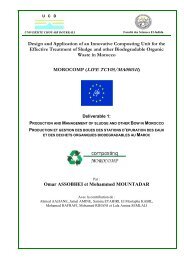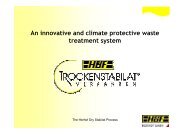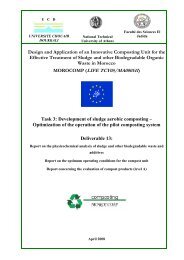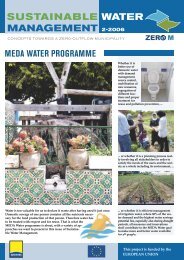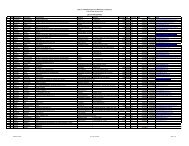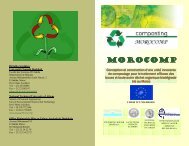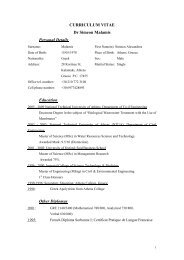(best examples and good practices) on household organic waste ...
(best examples and good practices) on household organic waste ...
(best examples and good practices) on household organic waste ...
You also want an ePaper? Increase the reach of your titles
YUMPU automatically turns print PDFs into web optimized ePapers that Google loves.
2<br />
1. Bio-WASTE MANAGEMENT LEGISLATION<br />
FRAMEWORK<br />
The first step <strong>on</strong> the management of biodegradable <strong>waste</strong> is the “GREEN<br />
PAPER” which sets the base up <strong>on</strong> which the “EU Legislati<strong>on</strong> Framework” for<br />
this type of <strong>waste</strong> is built. This Secti<strong>on</strong> aims to provide a comprehensive<br />
descripti<strong>on</strong> related to the priorities <str<strong>on</strong>g>and</str<strong>on</strong>g> principles of the existing European<br />
Uni<strong>on</strong> (EU) envir<strong>on</strong>mental policy <strong>on</strong> the management of Bio-<strong>waste</strong>. The<br />
relevant legislative framework is presented briefly below.<br />
1.1 GREEN PAPER (Brussels, 3.12.2008 COM (2008) 811 final) {SEC<br />
(2008) 2936}<br />
According to the “GREEN PAPER” <strong>on</strong> the management of Bio-<strong>waste</strong> in the<br />
European Uni<strong>on</strong>, Bio-<strong>waste</strong> is defined as biodegradable garden <str<strong>on</strong>g>and</str<strong>on</strong>g> park <strong>waste</strong>,<br />
food <str<strong>on</strong>g>and</str<strong>on</strong>g> kitchen <strong>waste</strong> from <strong>household</strong>s, restaurants, caterers <str<strong>on</strong>g>and</str<strong>on</strong>g> retail<br />
premises, <str<strong>on</strong>g>and</str<strong>on</strong>g> comparable <strong>waste</strong> from food processing plants. It does not<br />
include forestry or agricultural residues, manure, sewage sludge or other<br />
biodegradable <strong>waste</strong> such as natural textiles, paper or processed wood. It also<br />
excludes those by-products of food producti<strong>on</strong> that never become <strong>waste</strong>.<br />
The total annual arising of bio-<strong>waste</strong> in the EU according to Eurostat data <strong>on</strong><br />
municipal <strong>waste</strong> (2008), is estimated up to (76.5-102 Mt) food <str<strong>on</strong>g>and</str<strong>on</strong>g> garden <strong>waste</strong><br />
included in mixed municipal solid <strong>waste</strong> <str<strong>on</strong>g>and</str<strong>on</strong>g> up to (37 Mt) from the food <str<strong>on</strong>g>and</str<strong>on</strong>g><br />
drink industry. Bio-<strong>waste</strong> is a putrescible, generally wet <strong>waste</strong>. There are two<br />
major streams: green <strong>waste</strong> from parks, gardens etc. <str<strong>on</strong>g>and</str<strong>on</strong>g> kitchen <strong>waste</strong>. The<br />
former includes usually 50-60% water <str<strong>on</strong>g>and</str<strong>on</strong>g> more wood (lignocelluloses), the<br />
latter c<strong>on</strong>tains no wood but up to 80% water.<br />
Nowadays, there are many different policies that apply to the management of<br />
Bio-<strong>waste</strong>, applied to many countries, though the aim of their effort is to reduce<br />
the quantity <str<strong>on</strong>g>and</str<strong>on</strong>g> give a final <strong>waste</strong> with a better quality, with less<br />
microorganisms <str<strong>on</strong>g>and</str<strong>on</strong>g> less toxicity to the envir<strong>on</strong>ment. Bio-<strong>waste</strong> seems to be the<br />
type of <strong>waste</strong> to be used most in the future for the producti<strong>on</strong> of better quality<br />
compost <str<strong>on</strong>g>and</str<strong>on</strong>g> Green –energy.<br />
1.1.2Directive 2008/98/EC of the European Parliament <str<strong>on</strong>g>and</str<strong>on</strong>g> of the Council of 19<br />
November 2008 <strong>on</strong> <strong>waste</strong> <str<strong>on</strong>g>and</str<strong>on</strong>g> repealing certain Directives<br />
According to this revised directive, all types of <strong>waste</strong> should be treated in a way<br />
that reassures the envir<strong>on</strong>mental protecti<strong>on</strong>, while the human health must be



